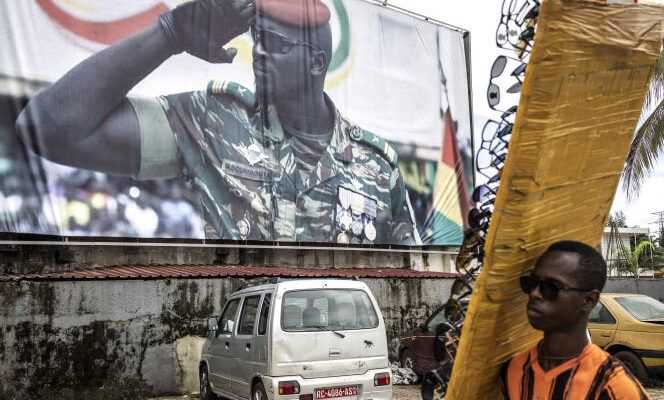To stay up to date with African news, subscribe to the “World Africa” newsletter from this link. Every Saturday at 6 a.m., find a week of current events and debates treated by the editorial staff of World Africa.
In Guinea, while the junta is continuing its consultations with the country’s political actors, civil society is on the lookout. After the September 5 coup d’état – the third in sixty-three years of independence – which overthrew President Alpha Condé, can the country sink into violence?
Alseny Sall, spokesperson for the Guinean Organization for the Defense of Human and Citizen’s Rights (OGDH), warns the putschists against the mistakes of the past in order to prevent history from repeating itself.
In recent years, your organization has continued to denounce human rights violations in Guinea, whether under the Alpha Condé regime or under the junta of Captain Moussa Dadis Camara, notably with the massacre of September 28, 2009 in the large stadium of Conakry, during which more than 150 people were killed and a hundred women raped. Are you afraid of further violence today?
Alseny Sall For the moment, we are watching the junta cautiously because we have had an unfortunate experience of coups d’état. Colonel Doumbouya’s statements are reassuring. He promised a break with the past. But what worries us is the lack of visibility around the junta. We don’t really know who makes it up, who does what. We also need her to urgently communicate a roadmap to frame the transition.
Do you have any information concerning the deaths that occurred during the putsch? We hear about dozens of soldiers killed …
It seems that there were casualties during the clash between the special forces and the presidential guard. However, no figure has come back to us for the moment. Regarding the acts of violence, we did not receive specific information either.
The junta on Tuesday launched a series of meetings with political parties and civil society to prepare for the transition. How do you judge these consultations?
It is a good initiative, but the modalities raise questions. A two-hour time slot is provided for each meeting. This is insufficient when we know the plethora of political parties and civil society organizations in Guinea. Especially since no agenda has been communicated on the content of the consultations. They therefore risk being unproductive. The junta must organize itself better, Lieutenant-Colonel Doumbouya must not concentrate all powers. Why not decentralize management through commissions?
Since its independence in 1958, Guinea has experienced two coups d’état and failed transitions. Can this third coup lead to the stabilization of the country, as many Guineans who support the junta seem to think?
Guineans must understand that the junta will not be able to solve all their problems. We start from very far. Previous transitions have failed because those who participated in them stayed in business after the exception period. They were not watched and went astray. Today, civil society must fully play its role of watchdog for the transition to succeed.
In addition, the mistake not to make would, in my opinion, be to organize local and legislative elections after the presidential election. Alpha Condé had settled into a logic of control of electoral processes after coming to power [en 2010], which led to a serious political deadlock and deadly post-election violence.
The objective of the junta must be to unblock the political process by organizing general elections. We must allow a return to constitutional order and the stabilization of the future president elect. Colonel Mamady Doumbouya indicated that “Justice will be the compass that will guide every citizen”. We are waiting to see how this plays out on the ground.
For us, the fight against impunity for bloodshed and economic crimes, which has become endemic, must be a priority for the next government. The choice of men and women who will participate in the various organs of the transition will be decisive in order to avoid falling back into the mistakes of the past. If Colonel Doumbouya fails, all of Guinea fails.
Opposition leader Cellou Dalein Diallo is in favor of the junta leader leading the transition, alongside a civilian prime minister. Does this distribution in favor of the military seem desirable to you?
For many Guineans, Doumbouya is the one who freed them from the Condé regime, accused of having slowed down the momentum of the democratic process in our country because of his stubbornness in maintaining power at all costs. Added to this is the poverty in which the majority of Guineans struggle. The people were fed up with this system.
One only has to see the immense hope aroused by Doumbouya. On September 5, all the communities, Malinké, Peuls, Soussou and others, expressed their joy. The main thing today is that Doumbouya is laying the foundations for overhauling the institutions, by drawing up a new Constitution. So I am not against the fact that he is chairing this transition, but civil society will be there to monitor him.
